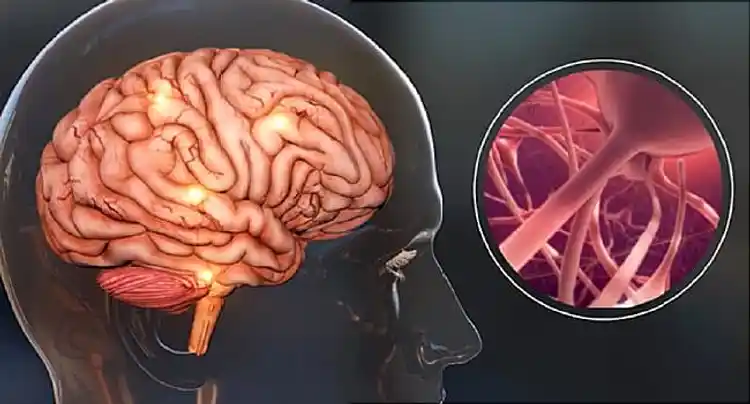What Happens in Your Brain When You Have MS

Hide Video Transcript
Video Transcript
[MUSIC PLAYING]
MS causes the immune system to mistake the myelin for a foreign body and attacks it, stripping away the layers of insulation. This process, known as demyelination, leaves neurons exposed, eventually leading to lesioning and scarring known as sclerosis. When sclerosis occurs, quick and smooth messages between the brain and the rest of the body become interrupted and scrambled, which can lead to unpredictable symptoms.
Nerve damage can occur anywhere on the spinal cord and/or brain, which is why MS symptoms may vary from person to person. Depending on the location and severity of the damage, symptoms may include altered sensations such as numbness, tingling, and pain, difficulties with movement. In about 50% of cases, cognitive symptoms, such as brain fog, trouble focusing, depression, memory problems, and fatigue. For more information, talk to your doctor.
SPEAKER
Multiple sclerosis, or MS, is a chronic neurological disease that impacts the brain, spinal cord, and central nervous system. Your brain uses electrical signals to communicate with your body. Just like electric wires, your nerve cells have to be insulated in order to properly transfer messages. A fatty white substance known as myelin provides this insulation for your nerve fibers and allows messages from the brain to move quickly and smoothly to other parts of the body. MS causes the immune system to mistake the myelin for a foreign body and attacks it, stripping away the layers of insulation. This process, known as demyelination, leaves neurons exposed, eventually leading to lesioning and scarring known as sclerosis. When sclerosis occurs, quick and smooth messages between the brain and the rest of the body become interrupted and scrambled, which can lead to unpredictable symptoms.
Nerve damage can occur anywhere on the spinal cord and/or brain, which is why MS symptoms may vary from person to person. Depending on the location and severity of the damage, symptoms may include altered sensations such as numbness, tingling, and pain, difficulties with movement. In about 50% of cases, cognitive symptoms, such as brain fog, trouble focusing, depression, memory problems, and fatigue. For more information, talk to your doctor.
